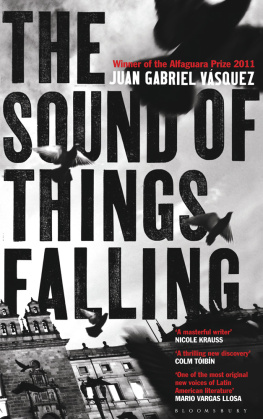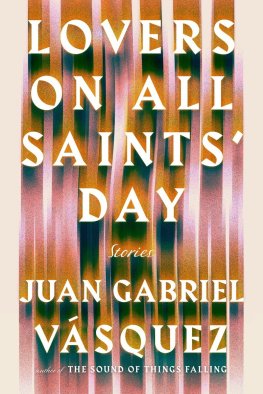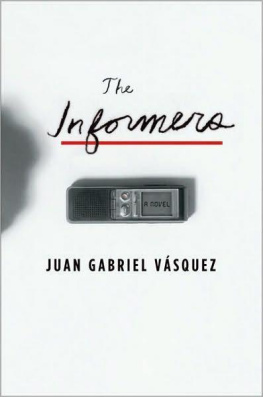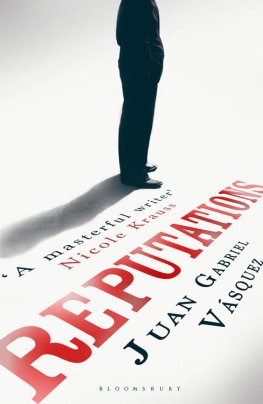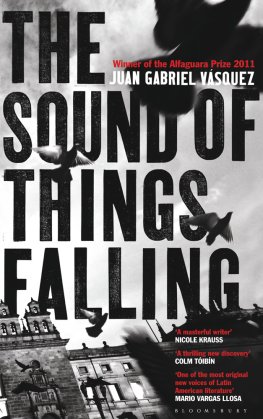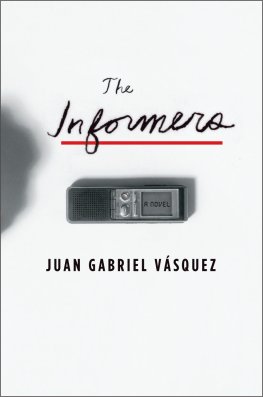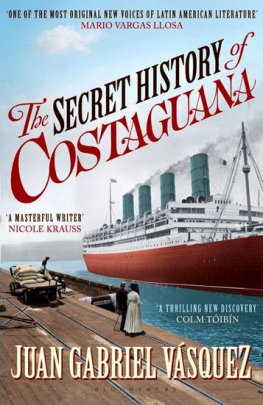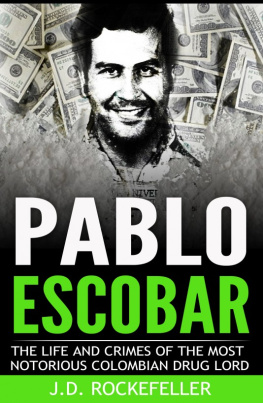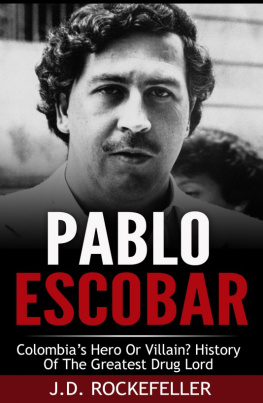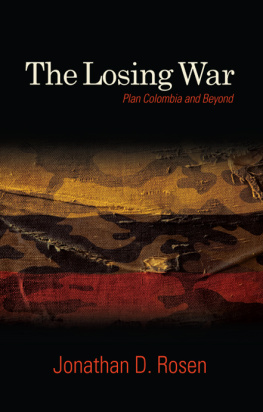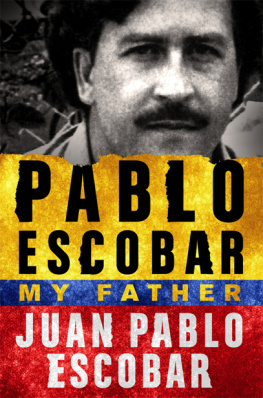The Informers
From the opening paragraph of The Informers , I felt myself under the spell of a masterful writer Nicole Krauss
When Gabriel Santoro publishes his first book, a biography of a Jewish family friend who fled Germany for Colombia shortly before World War Two, it never occurs to him that his father will write a devastating review in a national newspaper. Why does he attack him so viciously? Do the pages of his book unwittingly hide some dangerous secret? As Gabriel sets out to discover what lies behind his fathers anger, he finds himself undertaking an examination of the guilt and complicity at the heart of Colombian society, as one treacherous act perpetrated in those dark days returns with a vengeance half a century later.
For anyone who has read the entire works of Gabriel Garca Mrquez and is in search of a new Colombian novelist, then Juan Gabriel Vsquez's The Informers is a thrilling new discovery Colm Tibn, Guardian
Juan Gabriel Vsquez is one of the most original new voices of Latin American literature Mario Vargas Llosa
A fine and frightening study of how the past preys upon the present
John Banville
The Secret History of Costaguana
With wonderful panache, Vsquez has reinvented Conrad and his literary geography ... A vivid, forceful, masterly book Alberto Manguel, Guardian
London, 1903. Joseph Conrad is struggling with his new novel set in the South American Republic he calls Costaguana. Jos Altamirano, Colombian by birth, has just arrived in London, and comes to the writers aid by telling him his life story. When Nostromo is published the following year, however, Jos is outraged: his story is nowhere to be found. But the reader is about to discover the true story.
The Secret History of Costaguana is a comic, tragic, despairing, but above all exhilarating novel, told by a bumptious narrator with a score to settle. It is Latin Americas lively riposte to Europes limiting vision of the continent and confirms Juan Gabriel Vsquezs reputation as one of the leading novelists of his generation.
Splendid Daily Telegraph
Highly layered and intelligent the most erudite and inventive Colombian novelist writing today Independent
Order your copies:
By phone: +44 (0) 1256 302 699
By email: direct@macmillan.co.uk
Delivery is usually 35 working days
Free postage and packaging for orders over 20
Online: www.bloomsbury.com
www.bloomsbury.com
And the walls of my dream were collapsing to the ground, just as a city collapses in screams.
Aurelio Arturo, City Dream
So you fell out of the sky too!
What planet are you from?
Antoine de Saint-Exupry, The Little Prince
I began The Sound of Things Falling in June 2008 , during six weeks I spent at the Santa Maddalena Foundation (Donnini, Italy), and would like to thank Beatrice Monti della Corte for her hospitality. I finished the novel in December 2010 , in the house of Suzanne Laurenty (Xhoris, Belgium), and to her also go my grateful thanks. Between the two dates many people enriched and improved this novel. They know who they are.
Juan Gabriel Vsquez was born in Bogot in 1973 . He studied Latin American Literature at the Sorbonne between 1996 and 1998 , and has translated works by E. M. Forster and Victor Hugo, among others, into Spanish. He was nominated as one of the Bogot , South Americas most promising writers of the new generation. His previous books include The Informers , which was shortlisted for the Independent Foreign Fiction Prize, and The Secret History of Costaguana , which won the Qwerty Prize in Barcelona. His books have been published in fifteen languages worldwide. After sixteen years in France, Belgium and Spain, he now lives in Bogot.
Anne McLean has translated Latin American and Spanish novels, short stories, memoirs and other writings by authors including Hector Abad, Carmen Martn Gaite, Julio Cortzar, Ignacio Martnez de Pisn, Enrique Vila-Matas and Toms Eloy Martnez. She has twice won the Independent Foreign Fiction Prize: for Soldiers of Salamis by Javier Cercas in 2004 (which also won her the Premio Valle Incln), and for The Armies by Evelio Rosero in 2009 . In 2012 she was awarded the Spanish Cross of the Order of Civil Merit in recognition of her contribution to making Spanish literature known to a wider public. She lives in Toronto.
The Informers
The Secret History of Costaguana
Contents
For Mariana, inventor of spaces and time
First published in Great Britain 2012
This electronic edition published in 2012 by Bloomsbury Publishing Plc
Originally published in Spain 2011 by Alfaguara
(Santillana Ediciones Generales) as
El ruido de las cosas al caer
Copyright 2011 by Juan Gabriel Vsquez
English translation copyright 2012 by Anne McLean
The moral right of the author has been asserted
All rights reserved
You may not copy, distribute, transmit, reproduce or otherwise
make available this publication (or any part of it) in any form, or by any means
(including without limitation electronic, digital, optical, mechanical, photocopying,
printing, recording or otherwise), without the prior written permission of the
publisher. Any person who does any unauthorised act in relation to this publication
may be liable to criminal prosecution and civil claims for damages
This book has been selected to receive financial assistance from English PENs
Writers in Translation programme supported by Bloomberg. English PEN exists to
promote literature and its understanding, uphold writers freedoms around the world,
campaign against the persecution and imprisonment of writers for stating
their views, and promote the friendly co-operation of writers and free exchange of ideas.
www.englishpen.org
Bloomsbury Publishing Plc
50 Bedford Square
London WC1B 3DP
www.bloomsbury.com
Bloomsbury Publishing, London, New Delhi, New York and Sydney
A CIP catalogue record for this book is available from the British Library
ISBN: 978 1 4088 3412 1
Visit www.bloomsbury.com to find out more about our authors and their books
You will find extracts, author interviews, author events and you can sign up for
newsletters to be the first to hear about our latest releases and special offers
I know, although I dont remember, that the bullet passed through my gut without touching any organs but burning nerves and tendons and finally lodging itself in my hip bone a few inches from my spinal column. I know I lost a lot of blood and that, in spite of the supposed universality of my blood type, the stocks of it were low in the San Jos Hospital at the time, or its demand on the part of Bogots afflicted society was too high, and my father and my sister had to donate some to save my life. I know I was lucky. Everyone told me so as soon as it was possible, and besides, I know, I know in an instinctive way. The notion of my luck, this I remember, was one of the first manifestations of my recovered consciousness. I dont remember, however, the three days of surgery: they have disappeared completely, obliterated by the intermittent anaesthesia. I dont remember the hallucinations, but I do remember that I had them; I dont remember having fallen out of bed due to the abrupt movements that one of them provoked, and, although I dont remember that they tied me down in the bed to prevent that from happening again, I do remember quite well the violent claustrophobia, the terrible awareness of my vulnerability. I remember the fever, the sweat that soaked my whole body at night and obliged the nurses to change the sheets, the damage I did to my throat and the corners of my very dry lips when I tried to yank out the respirator tube; I remember the sound of my own voice when I screamed and I know, although I dont remember this either, that my screams disturbed the rest of the patients on the floor. The patients or their relatives complained, the nurses ended up moving me to another room, and in this new room, during a brief moment of lucidity, I asked about Ricardo Laverde and found out (I dont remember from whom) that he had died. I dont think I felt sad, or maybe Im confusing, and always confused, the sadness at the news with the tears produced by pain, and anyway I know that there, busy as I was with the task of surviving, seeing the gravity of my own situation in the tattered expressions of those around me, I couldnt have thought much about the dead man. I dont remember, in any case, having blamed him for what had happened to me.
Next page
